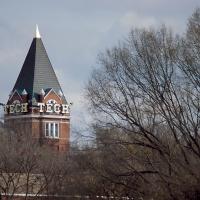Heme, the iron-holding molecule that gives blood its red color, is essential for life. Yet, ironically, it can be quite toxic if not properly handled. In fact, numerous diseases – from various cancers to cardiovascular diseases – are associated with defects in heme homeostasis. The way heme is biosynthesized and degraded has been known for…
As music distribution technology shifted from analog vinyl records to digital compact discs (CDs) and then to streaming files, the sound quality took a substantial hit – along with the monetary value of the musical consumer product. Now, as the vinyl format is enjoying a comeback, materials scientists at the Georgia Tech Research Institute (…
Amid the growing risk of cyber threats, there is a crucial need to provide the next generation of leaders with the skills to address these challenges. The Georgia Tech Research Institute (GTRI) has played a key role in this effort by bringing CyberStart America – a free online cybersecurity competition that helps high school students discover…
Most lightning travels between clouds and the ground, or within and between clouds. But a curious phenomenon known as “gigantic jets” fires powerful bursts of electrical charge – as much as 10 times larger than ordinary lightning – out the tops of clouds and into the lower portion of the ionosphere where the Earth’s atmosphere transitions into…
The voices of citizens from marginalized and underserved populations, such as older adults and people with disabilities, are vital to the development of more inclusive cities. Researchers at the Georgia Institute of Technology designed a solution that could help the planning process. In a paper published in the Journal of E-Planning Research, the…
The Defense Advanced Research Projects Agency (DARPA) is coming to Georgia Tech October 25 and 26 to connect with academic and industry innovators with a goal of growing the agency’s community of talent and partnerships. The meeting is part of a series of six events called DARPA Forward being held in key U.S. research and development hubs. The…
Struggling with keeping your home clean and organized? You may soon have an extra set of hands to help around the house. Imagine a home robot that can keep a house tidy without being given any commands from its owner. Well, the next step in home robotics is here — at least virtually. A group of doctoral and master’s students from Georgia Tech's…
At the Georgia Tech Research Institute (GTRI), you will find people dedicated to expanding their knowledge and solving problems. Research Engineer Benjamin (Ben) Ruvalcaba-Alonso embodies those ideals both in his GTRI role and in his local San Diego, California community. As a project manager, Ben leads a team of approximately 15 engineers.…
The School of Interactive Computing in the College of Computing at Georgia Tech seeks to redefine the human experience of computing using two primary tools: research and innovation in computing education. This installment of the Faces of Research Q&A series is with Matthew Gombolay, assistant professor of interactive…
By 2050, more than 150 million people are projected to be living with dementia. Alzheimer’s disease, the most common form of dementia, makes up roughly 70% of all cases. Alzheimer’s causes progressive neurodegeneration – a hallmark of the disease which is thought to initiate and track cognitive decline in those suffering with it. But while…













